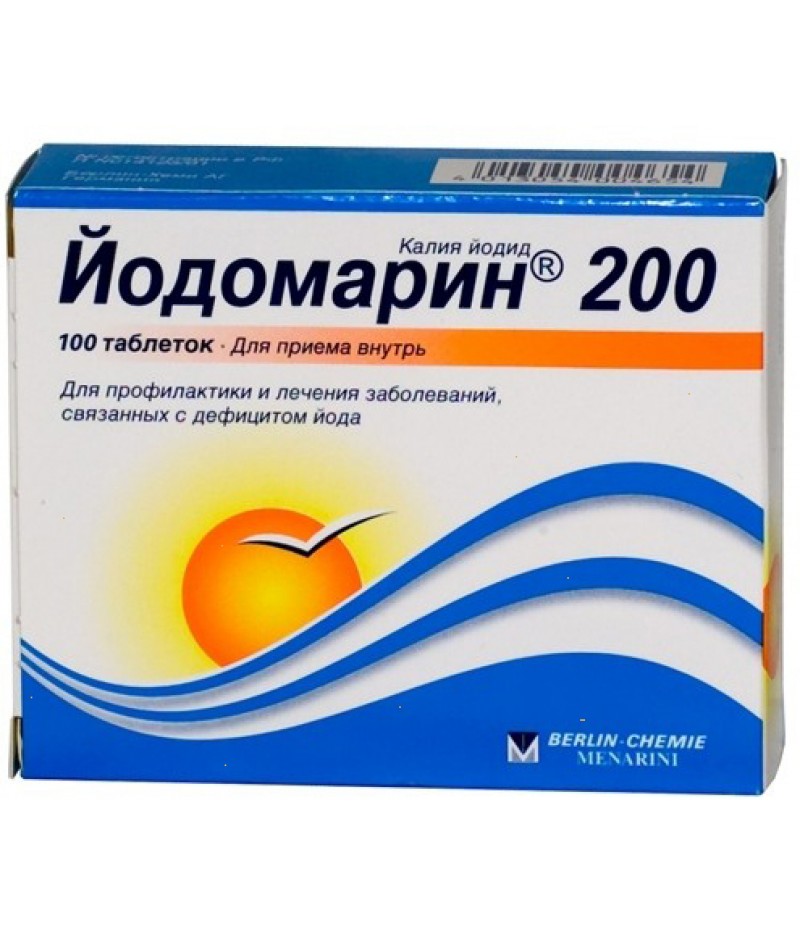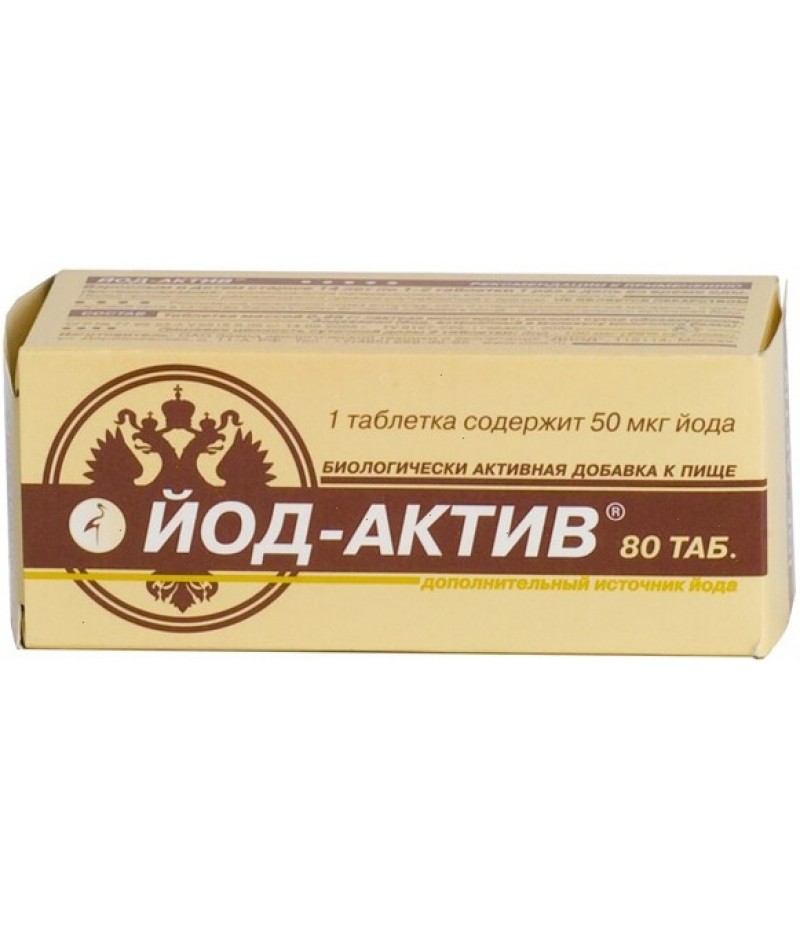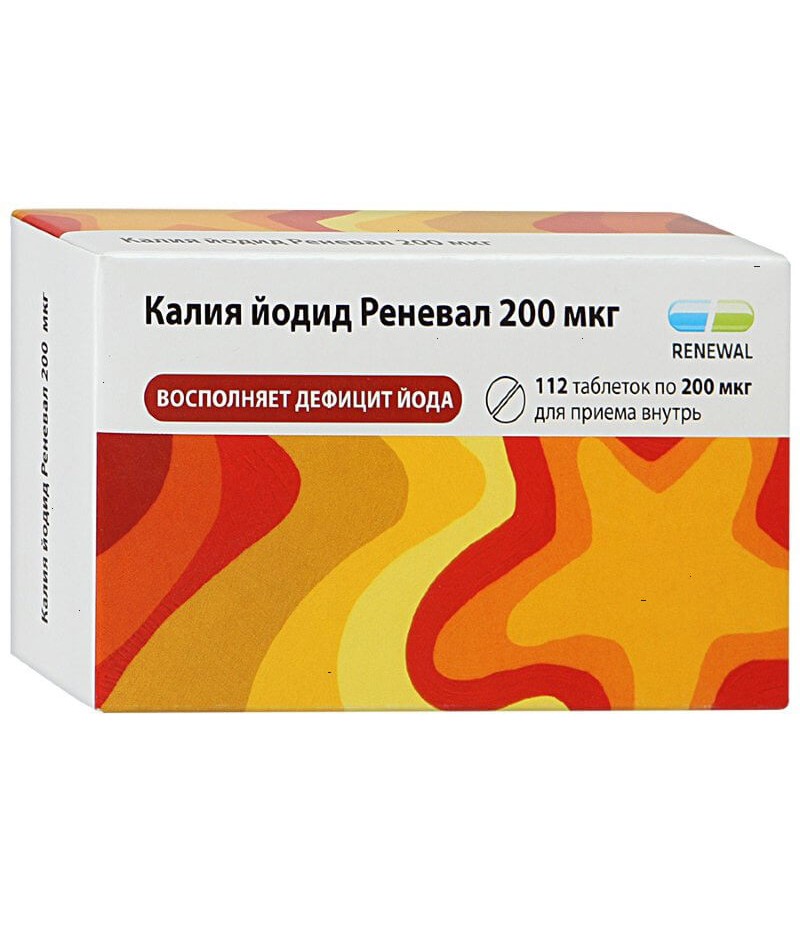Iodomarin 200 #100
- $9.67
- 3 or more $8.90
- Availability:In Stock
You can buy Iodomarin on this pageIodomarin instruction for useCompositionIodomarin contains 100 or 200 μg of iodine in the form of potassium iodide, as well as auxiliary components: lactose in the form of monohydrate (Lactose mon..
You can buy Iodomarin on this page
Iodomarin instruction for use
Composition
Iodomarin contains 100 or 200 μg of iodine in the form of potassium iodide, as well as auxiliary components: lactose in the form of monohydrate (Lactose monohydrate), magnesium carbonate (Magnesium carbonate) basic, gelatin (Gelatine), carboxymethyl starch sodium (Sodium carboxymethyl starch), colloidal silicon dioxide (Silicium dioxide colloidal), magnesium stearate (Magnesium stearate).
Form of issue
Iodomarin is a flat-cylindrical, white colored tablet, round in shape, with a risk and a facet.
Iodomarin 100 is packaged in vials of 50 or 100 pieces (in one pack 1 bottle).
Iodomarin 200 is packaged in blisters of 25 pieces (in one pack of 2 or 4 blisters).
pharmachologic effect
Correction of iodine deficiency states.
Pharmacodynamics and pharmacokinetics
The use of iodomarine is indicated for the treatment and prevention of thyroid disease.
Iodine - is an indispensable for the human body, a vital microelement, without which normal activity of thyroid gland (thyroid gland) is impossible.
Her hormones regulate the work of the brain, heart, nervous and vascular systems, mammary glands, ovaries in women and testes in men, ensure the correct course of metabolic processes in the body (including proteins, carbohydrates and fats), actively participate in energy metabolism, and are also responsible for the growth and normal development of the child.
The use of Iodomarin makes it possible to compensate for iodine deficiency with insufficient intake of it with food, which is especially important in childhood, during childbearing and breastfeeding, and also for people who live in geochemical zones with poor iodine soil and water.
Entering the body in physiological amounts of iodine allows to normalize the size of thyroid gland in children and young adults, as well as the ratio of thyroid hormones thyroid T3 and T4 and the level of thyroid-stimulating hormone.
After oral administration, iodine is almost fully absorbed in the small intestine, after which it is distributed in the intercellular space for 2 hours and cumulates in the thyroid gland, salivary and mammary glands, kidneys, and stomach.
The concentration in the blood plasma after applying the standard dose p / os is from 10 to 50 ng / ml, while the concentration of iodine in breast milk, saliva and gastric juice is 30 times higher than its concentration in the blood plasma.
The thyroid gland contains 75% of the total iodine content in the body (10 to 20 mg).
From the body, iodine is eliminated mainly, along with urine, and also - to a lesser extent - with the lungs and with the contents of the intestine.
Indications for use
prevention of endemic goiter (associated with inadequate iodine content in the habitat);
prevention of recurrence of goiter after finishing a course of conservative treatment with drugs of thyroid hormones or surgical removal;
treatment of eudireoid (non-toxic diffuse) goiter provoked by iodine deficiency in children, adolescents and adults less than 40 years of age.
Contraindications
Contraindications to the use of Iodomarin are:
hypersensitivity to iodine;
hyperthyroidism;
senile (herpetiform) dermatitis.
With toxic thyroid adenoma (Plummer's syndrome), nodular goiter is contraindicated in the use of the drug in doses exceeding 300 micrograms per day. An exception is the need for an iodine-induced blockade of the thyroid gland before surgery on this organ.
It is recommended to avoid the appointment of a remedy:
during the period of therapy with radioactive iodine;
patients who are diagnosed with thyroid cancer, and if there is a suspicion of a cancer.
Is it possible to take Iodomarin in hypothyroidism?
Iodomarin in hypothyroidism is prescribed only in those cases when the latter developed against a background of pronounced iodine deficiency.
Side effects
Treatment of nontoxic diffuse goiter in newborn infants, children and adolescents, and the use of Iodomarin for prophylactic purposes (at any age), usually does not provoke side effects.
In rare cases, against the background of long-term use of the drug, it is possible to develop iodism - aseptic inflammation of the skin and mucous membranes in the areas of iodine release (in the area of the paranasal sinuses, salivary glands, respiratory tract).
It manifests itself in the form of "cold" symptoms (lacrimation, conjunctivitis, runny nose, cough, "iodine fever", etc.), bronchitis, the appearance of metallic taste in the mouth and characteristic odor from the mouth, increased salivation, urticaria, increased thirst, staining oral cavity, diarrhea, seizures, weakness, dizziness, soreness and burning sensation in the throat, a special rash on the skin (iododerma) and "iodine" acne. Vomit is yellow or blue.
In extremely rare cases, exfoliative dermatitis or Quincke's edema may develop.
When using the drug at a dose exceeding 150 μg / day, hidden (masked) hyperthyroidism often turns into a manifest form (true hyperthyroidism).
Prolonged use of the drug at a dose exceeding 300 μg / day can provoke iodine-induced thyrotoxicosis (especially the probability of its development in elderly patients who have a history of goiter in a sufficient long time, in the presence of a disease or nodal goiter ).
Instructions for Iodomarin (Method and Dosage)
Instructions for use Iodomarin 200
For the prevention of iodine deficiency and endemic goiter (in cases where the amount of iodine entering the body does not exceed 150-200 μg / day), one should take:
¼-½ tablets / day. (50-100 mcg / day) - children under 12 years (including newborn babies);
½-1 tablets / day. (100-200 mcg / day) - patients older than 12 years;
1 table / day. (200 mcg / day) to pregnant women and during lactation.
To prevent the recurrence of iodine-deficient goiter after thyroidectomy, and after the completion of the course of therapy with thyroid hormone preparations, both children and adults are prescribed to take 1-2 tablets a day daily.
Treatment of euthyroid goiter involves taking:
from 100 to 200 micrograms of iodine per day (½-1 tablet of Iodomarin 200) - for children;
from 300 to 500 micrograms of iodine per day (from 1 ½ to 2 ½ tablets) for adults.
How to take Iodomarin 200?
Tablets should be taken after a meal. Drink them with a sufficient amount of liquid, for example, a glass of water. Children up to three years (including newborns) should be ground before taking the pill beforehand.
To take the drug for preventive purposes is usually recommended from several months to several years, often - throughout life. To treat goiter, newborns usually require 2 to 4 weeks, in older children and adults - six months or more.
In general, the questions of dosing and the duration of the use of the drug for the prevention or treatment of thyroid disorders are decided individually by the attending physician.
Overdose
Symptoms of an overdose of Iodomarin are:
reflex vomiting (in this case, vomit has a blue color, which is due to the presence in the food of starch-containing components);
staining the mucous in brown;
Diarrhea (possibly melena, ie black, tarry stools);
stomach ache.
In especially severe cases, dehydration and shock are possible. Also, cases of stenosis of the esophagus and the appearance of the phenomenon of "iodism" were recorded.
In case of acute intoxication, the patient is shown gastric lavage with a starch solution, a solution of five percent sodium Sodium thiosulfate or protein (up to removal of all traces of iodine), anti-shock therapy, the appointment of symptomatic treatment to correct the disturbed water-electrolyte balance.
In case of chronic intoxication should stop taking the drug.
With iodine-induced hypothyroidism, Iodomarin should be discontinued. Treatment in this case is aimed at normalizing the metabolism by prescribing thyroid hormones.
If the drug has developed iodine-induced thyrotoxicosis in a mild form, the patient does not need specific treatment. In more complex cases it is necessary to perform thyreostatic therapy (it should be remembered that its effect is always delayed).
In thyrotoxic crisis, intensive therapy, plasma-cytophireperasis or thyroidectomy are required.
Interaction
Excessive iodine content lowers, and insufficient increases the effectiveness of treatment of hyperthyroidism with thyreostatic drugs. In conjunction with this before drinking these medicines, as well as during the treatment of hyperthyroidism, it should, if possible, avoid taking iodine in any form.
On the other hand, thyreostatic drugs inhibit the transformation of iodine into an organic compound in thyroid gland and, consequently, can cause the development of goiter.
Combination therapy with high doses of iodine and preparations containing lithium salts can provoke hypothyroidism and goitre development.
Iodomarin in high doses in combination with potassium-sparing diuretics can cause hyperkalemia.
Terms of sale
Without recipe.
Storage conditions
Tablets are stored at a temperature of 10-25 degrees Celsius in a place inaccessible to children.
Shelf life
3 years.
special instructions
When treating iodomarin in patients with renal insufficiency, hyperkalemia may develop.
The composition of the tablets includes lactose, so they should not be taken in patients with lactase deficiency, galactose intolerance or glucose-galactose malabsorption syndrome.
Iodomarin during pregnancy and breastfeeding
Pregnant women and lactation have an increased need for iodine.
In the first trimester, when the main organs and systems of the child are laid and formed, the insufficient supply of this trace element can cause a change in the hormonal background in the mother and, consequently, the formation of fetus (primarily the child's brain).
In children who have not received enough iodine during prenatal development, pathologies of the development of the nervous system, problems with thyroid disease (up to the appearance of neoplasms), mental malformations and mental retardation are possible.
In the early stages of pregnancy, the thyroid gland of the fetus is absent, so it is absolutely dependent on the hormones of the mother. Therefore, to avoid problems after conception, doctors recommend starting to drink iodine preparations even when planning pregnancy (optimally - for half a year, so that the body was well prepared for bearing a child).
Also, iodine deficiency can provoke the launch of a protective mechanism: taking pregnancy as an additional burden, the mother's body will get rid of it in every possible way. In especially difficult cases, miscarriage often occurs.
When using Iodomarin for pregnant and lactating women, it should be remembered that potassium iodide has the ability to penetrate the placenta and into breast milk. Therefore, take the drug should be strictly in the recommended doses.
Dosage in pregnancy, as a rule, the following - 200 mcg / day .: Iodomarin 200 in pregnancy, take 1 tablet a day, Iodomarin 100 - 2 tablets per day.
Reviews about Iodomarin
Reviews for Iodomarin 100, as well as reviews on Iodomarin 200, are mostly positive. The use of the drug for therapeutic purposes can reduce the symptoms of the disease, while taking the same tablets for preventive purposes, many people note a decrease in irritability, improving overall health and memory, increasing concentration.
No less good reviews on Iodomarin during pregnancy. In women, the use of this drug can prevent the development of iodine deficiency disorders and associated diseases, normalize the flow of protein, lipid and carbohydrate metabolism, and ensure normal brain and cardiovascular activity.
For a child, sufficient intake of iodine is a guarantee of normal physical and mental development.
In some reviews, people write that taking Iodomarin helped them bring the weight to normal. So, is it possible to use the drug for weight loss? Endocrinologists answer, that it is possible, but only under indications of the doctor.
In some situations, excess weight is a consequence of a decreased function of the thyroid gland, and then it can not be thrown off with the help of diets, or with the help of physical exertion.
In some situations, excess weight is a consequence of a decreased function of the thyroid gland, and then it can not be thrown off with the help of diets, or with the help of physical exertion.
The manufacturer does not recommend taking iodomarine for hypothyroidism, except, however, those cases when the disease is associated with a clear iodine deficiency.
It should be remembered that the regulation of thyroid hormone secretion is met with pituitary hormone thyrotropin, but the hormones of the hypothalamus, which in turn are controlled by the cerebral cortex, account for the regulation of the pituitary gland on the thyroid gland.
Hormones of the thyroid gland also affect the pituitary gland, the hypothalamus, a number of endocrine glands, the course of metabolic processes, the condition of internal organs and their systems.
Thus, the uncontrolled intake of Iodomarin in order to lose weight can provoke serious violations of the usual rhythm of thyroid activity and, as a result, the entire endocrine system of the body with all the ensuing consequences.
For soft stimulation of thyroid function and activation of metabolic processes, it is recommended to revise your diet first, supplementing it with foods high in iodine (seafood, onions, garlic, eggplant, beets, radish, persimmon, grapefruits, etc.), or at least replacing ordinary salt iodized.
Iodomarin is used as a supplement to a diet. Take it for weight loss is possible only after consulting a doctor and not exceeding the recommended dose.



